反身代词
反身代词英语词汇大全

反身代词英语词汇大全反身代词作为英语语法中的一部分,用于强调动作的执行者与该动作的承受者是同一个人或物。
在英语中,反身代词有自己独特的用法和词汇。
本文将为您列举一些常见的反身代词,并进行适当的解释和用例说明。
一、单数反身代词1. Myself- 代词本身的含义:我自己- 用例:- I will do it myself.(我自己来做。
)- I talked to myself in the mirror.(我对着镜子自言自语。
)2. Yourself- 代词本身的含义:你自己(单数)- 用例:- You can do it yourself.(你自己可以做。
)- Did you buy this for yourself?(你是为了自己买的这个吗?)3. Himself- 代词本身的含义:他自己- 用例:- He fixed the car himself.(他自己修理了汽车。
)- He blamed himself for the mistake.(他因为错误责备自己。
)4. Herself- 代词本身的含义:她自己- 用例:- She dressed herself for the party.(她自己为晚会打扮。
)- She taught herself how to play the guitar.(她自学会了弹吉他。
)5. Itself- 代词本身的含义:它自己- 用例:- The cat licked itself.(猫舔了一下自己。
)- The machine turns itself off automatically.(机器会自动关闭。
)二、复数反身代词1. Ourselves- 代词本身的含义:我们自己- 用例:- We will clean the house ourselves.(我们自己来打扫房子。
)- We are responsible for ourselves.(我们自己对自己负责。
英语反身代词表格

英语反身代词表格第一人称的反身代词有:myself(我自己)、ourselves(我们自己)第二人称的反身代词有:yourself(你自己)、yourselves(你们自己)第三人称的反身代词有:himself(他自己)、herself(她自己)、itself (它自己)、themselves(他们自己)。
反身代词是英语中用来强调动作的发出者的代词。
其含义是“本身、自己”,能够加强说话者的语气。
在英语中反身代词是由单复数的区分的,也可以根据人称来划分,下面我们就来看看反身代词有哪些?通过上面表格的内容,我们能够总结出来反身代词是根据人称代词变化而来的,主要有两个变化规则。
1)、第一人称和第二人称的反身代词的单数是由形容词性物主代词+self构成的;复数是由形容词性物主代词+selves构成的。
2)、第三人称的反身代词的单数是由人称代词的宾格+self构成的;复数是由人称代词的宾格+selves构成的。
下面我们看一下,反身代词在句子是如何使用的?反身代词在英语句子中是可以充当同位语、宾语、表语等成分。
比如:the car itself is very heavy, you can’t move it. 这个汽车本身是很重的,你不能可能移动它。
(同位语) You can take good care of yourself in the school. 你在学校可以照顾好你自己。
(宾语) Don’t listening anyone, you just to be yourself. 不要听从任何人的,你只需要做你自己。
(表语)在我们使用反身代词的时候,我们一定要注意人称代词的单复数,选择正确的反身代词。
我们在翻译反身代词的时候,要清楚反身代词在句子中充当的成分,之后再进行翻译。
反身代词

一、反身代词的基本形式反身代词是指表示自己的代词,是oneself根据所指词的人称、性别、单复数等的变化可以有myself, himself, herself, yourself, itself, ourselves, yourselves, themselves 等形式。
二、oneself与himself当one指人时,其相应的反身代词通常用oneself, 在美国英语中也可用himselfOne should not praise oneself [himself]. 一个人不应该自吹自擂。
三、反身代词的句法功能:1. 用作同位语(加强被修饰词的语气,紧放在被修饰名词后, 或句末):The box itself is not so heavy. 箱子本身并不重。
Martin himself took care of the sick man. 马丁亲自照顾病人。
You should come here yourself. 你必须亲自来。
You yourself said so. / You said so yourself. 你自己是这样说的。
Never leave to others what you ought to do yourself. 不要把自己该做的事留给别人做。
2. 用作宾语(动词或介词的宾语):Take good care of yourself. 照顾好自己。
He has a right to decide for himself. 他有权为自己做出决定。
He made no complaint for himself. 他没为自己抱怨什么。
She finally gained control of herself. 最后她控制住了自己。
She could not make herself understood. 她不能使别人听懂她的话。
Everybody here has the influenza including myself. 包括我在内所有人都患上流感。
反身代词
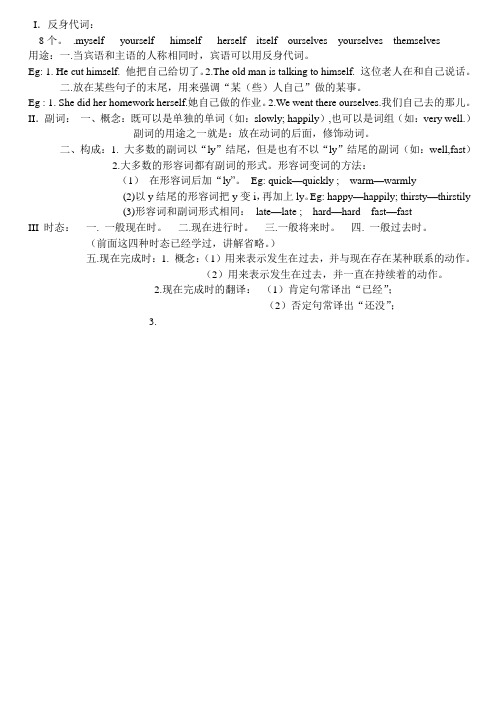
I.反身代词:8个。
.myself yourself himself herself itself ourselves yourselves themselves用途:一.当宾语和主语的人称相同时,宾语可以用反身代词。
Eg: 1. He cut himself. 他把自己给切了。
2.The old man is talking to himself. 这位老人在和自己说话。
二.放在某些句子的末尾,用来强调“某(些)人自己”做的某事。
Eg : 1. She did her homework herself.她自己做的作业。
2.We went there ourselves.我们自己去的那儿。
II.副词:一、概念:既可以是单独的单词(如:slowly; happily),也可以是词组(如:very well.)副词的用途之一就是:放在动词的后面,修饰动词。
二、构成:1. 大多数的副词以“ly”结尾,但是也有不以“ly”结尾的副词(如:well,fast)2.大多数的形容词都有副词的形式。
形容词变词的方法:(1)在形容词后加“ly”。
Eg: quick—quickly ; warm—warmly(2)以y结尾的形容词把y变i,再加上ly。
Eg: happy—happily; thirsty—thirstily(3)形容词和副词形式相同:late—late ; hard—hard fast—fastIII 时态:一. 一般现在时。
二.现在进行时。
三.一般将来时。
四. 一般过去时。
(前面这四种时态已经学过,讲解省略。
)五.现在完成时:1. 概念:(1)用来表示发生在过去,并与现在存在某种联系的动作。
(2)用来表示发生在过去,并一直在持续着的动作。
2.现在完成时的翻译:(1)肯定句常译出“已经”;(2)否定句常译出“还没”;3.。
英语反身代词

反身代词
反身代词又称为自身代词,表示某人
自己的代词,它表示一个动作行为反 射到行为执行者本身或强调自己,它 有人称或数的变化。它还可以在句中 起到强调的作用,用以加强语气。
反代词
人称 第一人称
分类
第二人称
第三人称
单数 myself yourself himself herself itself
The book itself is good. The boy himself is not bad.
1 反身代词不能单独做主语, 但可以做主语的同位语,起强 调作用。
如:我自己能完成作业。
(误)Myself can finish my homework..
(正) I myself can finish my homework. / I can finish my homework myself.
They were talking about it among themselves.
3).作表语:
I’m not feeling myself today.
- What’s wrong with you? You don’t look yourself today.
4). 作同位语,起强调作用
复数 ourselves yourselves themselves
1).作动词的宾语 We enjoyed ourselves last night. Please help yourself to some fish.
反身代词

1. My classmate, Li Ming, made a card for himself just now. _______ 2. Bad luck! I cut _______ myself with a knife yesterday. 3. They tell us they can look after __________ themselves very well. itself 4. My cat can find food by _____. 5. Help __________ yourselves to some beef, boys.
摔伤自己 hurt oneself 自言自语 say to oneself 沉浸于,陶醉于……之中 lose oneself in 把某人单独留下 leave sb. by oneself 给自己买…...东西 buy oneself sth. 介绍……自己 introduce oneself
1. 反身代词不能单独做主语,但可以做 主语的同位语,起强调作用。
小榄一中 陈洪甫
反身代词又称为自身代词,表示 动作行为反射到行为执行者本身。它 还可以在句中起到强调的作用,用以 加强语气。
英语中共有八个反身代词,在使用时应注 意和它所指的相应的对象在人称、性别、 数上保持一致。其基本形式如下表所示:
第一人称 单数 myself 第二人称 yourself 第三人称 himself herself itself themselves
2. 可用作表语,指的是表语和主语表示同一 个或同一些人或事物。 如:She isn’t quite herself today. 她今天身体不太舒服。
3. 可用作主语或宾语的同位语,常用来加强 语气。
反身代词

反身代词反身代词是一种表示反射或强调的代词。
它的基本含义是:通过反身代词指代主语,使施动者把动作在形式上反射到施动者自己。
因此,反身代词与它所指代的名词或代词形成互指关系,在人称、性质、数上保持一致。
1、第一、二人称的反身代词是由形容词性物主代词加上-self或-selves构成的。
如:I--myself we--ourselves you(单数)-- yourself you (复数)-- yourselves2、第三人称的反身代词是由人称代词的宾格加上-self 或-selves构成的。
如:she--herself he --himself it--itself they--themselves one--oneself用法1、作宾语,此时的宾语指的就是主语。
a. 有些动词需有反身代词absent, bath, amuse, blame, dry, cut, enjoy, hurt, introduce, behaveWe enjoyed ourselves very much last night. 我们昨晚玩得很开心。
Please help yourself to some fish. 请你随便吃点鱼。
b. 用于及物动词+宾语+介词take pride in, be annoyed with, help oneself to sth.I could not dress (myself) up at that time. 那个时候我不能打扮我自己。
注:反身代词和人称代词作宾语时具有不同的含义。
如:He saw himself in the mirror.他在镜子里看见了他自己。
(himself 和 he 为同一人)He saw him in the mirror.他在镜子里看见了他。
(him 显然指另外一人)2、作表语,此时的表语指的就是主语。
I am not myself today. 我今天不舒服。
反身代词
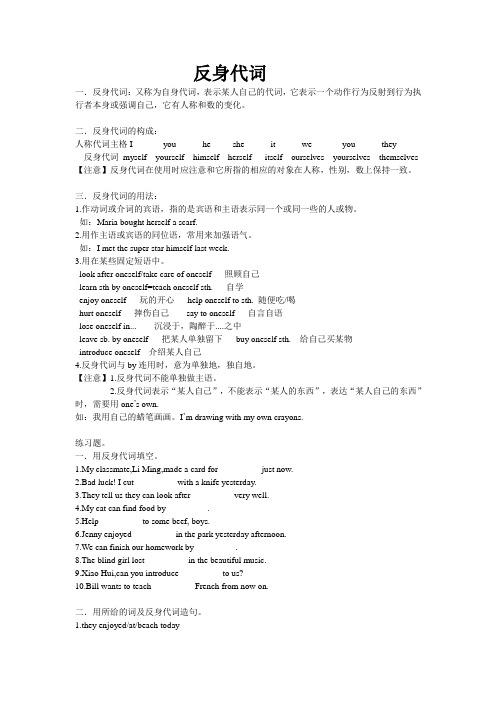
反身代词一.反身代词:又称为自身代词,表示某人自己的代词,它表示一个动作行为反射到行为执行者本身或强调自己,它有人称和数的变化。
二.反身代词的构成:人称代词主格I you he she it we you they反身代词myself yourself himself herself itself ourselves yourselves themselves 【注意】反身代词在使用时应注意和它所指的相应的对象在人称,性别,数上保持一致。
三.反身代词的用法:1.作动词或介词的宾语,指的是宾语和主语表示同一个或同一些的人或物。
如:Maria bought herself a scarf.2.用作主语或宾语的同位语,常用来加强语气。
如:I met the super star himself last week.3.用在某些固定短语中。
look after oneself/take care of oneself 照顾自己learn sth by oneself=teach oneself sth. 自学enjoy oneself 玩的开心help oneself to sth. 随便吃/喝hurt oneself 摔伤自己say to oneself 自言自语lose oneself in... 沉浸于,陶醉于....之中leave sb. by oneself 把某人单独留下buy oneself sth. 给自己买某物introduce oneself 介绍某人自己4.反身代词与by连用时,意为单独地,独自地。
【注意】1.反身代词不能单独做主语。
2.反身代词表示“某人自己”,不能表示“某人的东西”,表达“某人自己的东西”时,需要用one’s own.如:我用自己的蜡笔画画。
I’m drawing with my own crayons.练习题。
一.用反身代词填空。
1.My classmate,Li Ming,made a card for _________ just now.2.Bad luck! I cut _________ with a knife yesterday.3.They tell us they can look after _________ very well.4.My cat can find food by _________.5.Help _________ to some beef, boys.6.Jenny enjoyed _________ in the park yesterday afternoon.7.We can finish our homework by _________.8.The blind girl lost _________ in the beautiful music.9.Xiao Hui,can you introduce _________ to us?10.Bill wants to teach _________ French from now on.二.用所给的词及反身代词造句。
反身代词
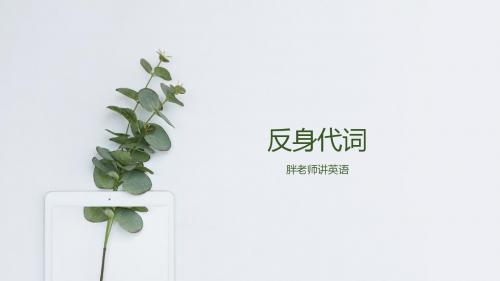
02
作表语;同位语
Eg. I am not myself today. The thing itself is not important.
03
用于but,except,for等介词后
介词后宾语用反身代词和人称代词宾格均可
Eg. No one but myself(me)is hurt.
04
反身代词不能单独作主语
they themselves
01
作宾语
(1)有些动词后面加反身代词,如enjoy,introduce
Eg. We enjoyed ourselves very much last night.
01
作宾语
(2)用于及物动词+宾语+介词。如take pride in,help
oneself to
Eg. Please help yourself to some fish.
Thank you
谢谢观看
反身代词
胖老师讲英语
反身代词
数
人称 人称代词 反身代词 第一人称 I myself
单数
第二人称 You yourself 第三人称 he/she/it Himself/her称
复数
第二人称 第三人称
人称代词 反身代词
we ouselves
you yourselves
(错)Myself drove the car. (对)I myself drove the car.
04
And,Or,Nor连接的并列主语中
第二个主语可以用反身代词,特别是myself作主语 Eg.Chales and myself saw it.
05
第二人称作宾语,用反身代词
反身代词
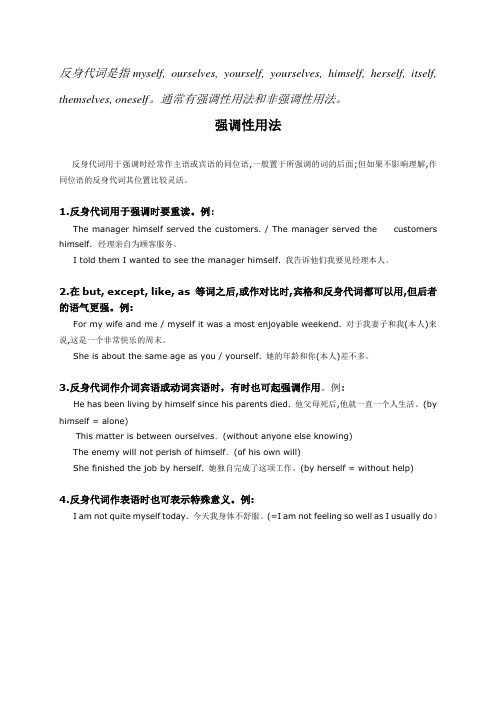
反身代词是指myself, ourselves, yourself, yourselves, himself, herself, itself, themselves, oneself。
通常有强调性用法和非强调性用法。
强调性用法反身代词用于强调时经常作主语或宾语的同位语,一般置于所强调的词的后面;但如果不影响理解,作同位语的反身代词其位置比较灵活。
1.反身代词用于强调时要重读。
例:The m anager himself served the custom ers. / The m anager served the custom ers himself. 经理亲自为顾客服务。
I told them I wanted to see the m anager himself. 我告诉他们我要见经理本人。
2.在but, except, like, as 等词之后,或作对比时,宾格和反身代词都可以用,但后者的语气更强。
例:For m y wife and me / myself it was a most enjoyable weekend. 对于我妻子和我(本人)来说,这是一个非常快乐的周末。
She is about the sam e age as you / yourself. 她的年龄和你(本人)差不多。
3.反身代词作介词宾语或动词宾语时,有时也可起强调作用。
例:He has been living by him self since his parents died. 他父母死后,他就一直一个人生活。
(by himself = alone)This m atter is between ourselves.(without anyone else knowing)The enem y will not perish of himself.(of his own will)She finished the job by herself. 她独自完成了这项工作。
反身代词

反身代词反身代词是一种表示反射或强调的代词。
它的基本含义是:通过反身代词指代主语,使施动者把动作在形式上反射到施动者自己。
因此,反身代词与它所指代的名词或代词形成互指关系,在人称、性、数上保持一致。
一、反身动代词的规律myself yourself形容词性物主代词+selfourselves yourselves形容词性物主代词+selveshimself herself人称代词宾格+selfthemselves人称代词宾格+selves二、反身动代词的构成第一、第二人称的反身代词由形容词的物主代词加上self, selves构成。
如:myself我自己 , ourselves我们自己 ,yourself你自己, yourselves你们自己.第三人称的反身代词是由宾格加上self, selves构成。
如:himself他自己, herself她自己, itself它自己 ,以及themselves他们/她们/它们自己。
值得注意的是,凡是单数人称代词的反身代词在后加self,而复数人称的反身代词在后加selves。
I you she he it onemyself yourself herself himself itself oneselfwe you theyourselves yourselves themselves三、反身代词的用法1、反身代词不能作主语,但是它可以作主语同位语,放在主语后或句末。
:如:我亲自去了电影院。
误:Myself went to the cinema.正:I went to the cinema myself.2、反身代词可以作宾语的同位语。
如:I wish I could hear Beethoven himself play this music.我希望我能听贝多芬他亲自弹这首曲子。
You can go and ask him himself.你可以去问他本人。
反身代词

反身代词有这些:单数: myself | yourself | himself | herself | itself复数: ourselves | yourselves | themselves当宾语与动词的主语相同时,反身代词作直接宾语:I am teaching myself to play the piano.Be careful with that knife. You might cut yourself.我们也可以将反身代词作为直接宾语,与及物动词连用,以下是常见的及物动词:amuseblamecutdryenjoyhelphurtintroducekillpreparesatisfyteach当间接宾语与动词的主语相同时,反身代词用作间接宾语:Would you like to pour yourself a drink?We’ve brought ourselves something to eat.当宾语与动词的主语相同时,反身代词用作介词的宾语:They had to cook for themselves.He was feeling very sorry for himself.但是,在方位介词之后,我们使用宾语代词,而不是反身代词。
He had a suitcase ++beside++ him. (NOT himself)并且在with之后,当它的意思是伴随着:She had a few friends ++with++ her. (NOT herself)我们通过以下方式将介词和反身动词一起使用:- 表明某人在没有任何帮助的情况下做了某事:The children got dressed by themselves.I prepared the whole meal by myself. - 表示某人是孤独的:He lived by himself in an enormous house.She walked home by herself.使用反身代词来强调我们所指的人或物:Kendal itself is quite a small town.•特别是如果我们谈论的是非常有名的人:Sir Paul McCartney himself sang the final song.当我们使用反身代词来强调时,通常将其放在该子句的末尾:I baked the bread myself.She mended the car herself.反身代词作为直接宾语时,有些动词的意义将会改变:Would you like to help yourself to another drink?= Would you like to take another drink?I wish the children would behave themselves.= I wish the children would behave well.He found himself lying by the side of the road.= He was surprised when he realised that he was lying by the side of the road.I saw myself as a famous actor.= I imagined that I was a famous actor.She applied herself to the job of mending the lights.= She worked very hard to mend the lights.He busied himself in the kitchen.= He worked busily in the kitchen.I had to content myself with a few euros.= I had to be satisfied with a few euros.。
反身代词

反身代词反身代词是一种表示反射或强调的代词。
它的基本含义是:通过反身代词指代主语,使施动者把动作在形式上反射到施动者自己。
因此,反身代词与它所指代的名词或代词形成互指关系,在人称、性、数上保持一致。
◆反身动代词的规律myself yourself形容词性物主代词+selfourselves yourselves形容词性物主代词+selveshimself herself人称代词宾格+selfthemselves人称代词宾格+selves◆反身动代词的构成第一、第二人称的反身代词由形容词的物主代词加上self, selves构成。
如:myself我自己, ourselves我们自己,yourself你自己, yourselves你们自己.第三人称的反身代词是由宾格加上self, selves构成。
如:himself他自己, herself她自己, itself它自己,以及themselves他们/她们/它们自己。
值得注意的是,凡是单数人称代词的反身代词在后加self,而复数人称的反身代词在后加selves。
I you she he it onemyself yourself herself himself itself oneselfwe you theyourselves yourselves themselves◆反身代词的用法1、反身代词不能作主语,但是它可以作主语同位语,放在主语后或句末。
:如:我亲自去了电影院。
误:Myself went to the cinema.正:I went to the cinema myself.2、反身代词可以作宾语的同位语。
如:I wish I could hear Beethoven himself play this music.我希望我能听贝多芬他亲自弹这首曲子。
You can go and ask him himself.你可以去问他本人。
3、反身代词可以作介词的宾语。
反身代词反身代词课件

在表示强调时使用反身代词
总结词
在表示强调时使用反身代词,可以突出动作的执行者或强调某个人的行为。
详细描述
在英语中,当需要强调某个动作是由特定的某个人执行的,或者强调某个人的行为时, 可以在句子中使用反身代词。例如,“She herself wrote the book.”(这本书是她 自己写的。)中的“herself”就是反身代词,强调这本书是由“她”自己写的,而不
反身代词的用法
当主语和宾语是同一人或事物时,使 用反身代词。
在表示谦虚或自谦时使用反身代词, 例如“I myself am not a good cook”表示“我”不是一个好厨师 。
在强调动作执行者时使用反身代词, 例如“I myself wrote the letter” 强调是“我”自己写的信。
填空练习是巩固反身代词知识的 一种有效方法。
详细描述
设计包含反身代词的句子,去掉 其中的反身代词,让学生根据上 下文语境填写正确的反身代词。
选择题练习
总结词
选择题练习可以帮助学生更好地理解 和掌握反身代词的用法。
详细描述
准备一系列包含反身代词的句子,每 个句子提供多个可能的选择,让学生 从中选择正确的反身代词。
反身代词课件
目录
• 反身代词的定义 • 反身代词的种类 • 反身代词的用法示例 • 反身代词的注意事项 • 练习与巩固
01 反身代词的定义
什么是反身代词
01
反身代词是一种代词,表示动作 的执行者与动作的承受者是同一 个人或事物。
02
反身代词通常放在动词之后,强 调动作的执行者。
反身代词的构成
在介词之后使用反身代词
总结词
在介词之后使用反身代词,表示动作的执行 者与介词所表示的对象是同一个人。
反身代词的使用条件

反身代词的使用条件一、什么是反身代词反身代词是一种特殊的代词,用于指代主语并强调其在句子中的作用。
它们与其先行词具有一致的人称、数和性别。
在英语中,主要有三种反身代词:myself、yourself、himself、herself、itself、ourselves、yourselves、themselves。
二、反身代词的使用条件1. 主语和宾语一致反身代词必须与其先行词在人称和数上一致。
当先行词是第一人称(I、we)、第二人称(you)或第三人称(he、she、it、they)时,反身代词的选择也要一致。
示例:•I saw myself in the mirror.(我在镜子里看到了自己。
)•You can hurt yourself if you’re not careful.(如果你不小心,会伤到自己的。
)•She bought herself a new dress.(她给自己买了一件新裙子。
)2. 反身动词的存在反身代词通常与反身动词一起使用,用于强调或表示自己完成某个动作。
反身动词是指动词作为主语的动作同时也是作用于主语本身的动作。
示例:•I taught myself to play the guitar.(我自学弹吉他。
)•They prepared themselves for the exam.(他们为考试做了准备。
)•She hurt herself while playing football.(她踢足球时受伤了。
)3. 强调语气的需要反身代词还可以用于强调主语的动作是由自身完成的。
这时,反身代词通常放在句子的末尾,用于加强主语的自我动作。
示例:•He himself solved the problem.(他自己解决了这个问题。
)•I myself witnessed the accident.(我亲眼目睹了这次事故。
)4. 表示互相作用或相互关系反身代词还用于表示互相作用或相互关系的情况下。
反身代词的形式和用法

反身代词的形式和用法一、形式反身代词是指在句子中作主语、宾语或补语,指示或代表动作的施事者和受事者同时存在的代词。
在英语中,反身代词的形式是在相应的人称代词后加上-self或-selves。
下面是反身代词的不同人称形式:主格宾格反身代词形式第一人称单数 I me myself第二人称单数 you you yourself 第三人称单数 he him himselfshe her herselfit it itself第一人称复数 we us ourselves 第二人称复数 you you yourselves 第三人称复数 they them themselves二、用法反身代词在句子中的使用具有一定的特点和规则:1.作反身代词的主语反身代词作主语时,常表示主体为动作的施事者和受事者,强调动作的自觉性或不及格性。
例句:① My mother taught herself how to cook.我的妈妈是自学会做饭的。
② We should take care of ourselves.我们应该照顾好自己。
2.作反身代词的宾语反身代词可以作及物动词的直接宾语或介词的宾语,表示动作的施事者和受事者为同一人或同一事物。
例句:① He hurt himself in the accident.他在事故中受伤了。
② They are always talking to themselves.他们总是自言自语。
3.作反身代词的补语反身代词可以作某些动词(如enjoy, find, imagine, see, picture等)和形容词(如proud, pleased, ashamed等)后的补语,表示强调自己或互相之间。
例句:① She is proud of herself for the achievement.她为自己的成就感到自豪。
② I can't imagine myself living without music.我无法想象没有音乐的生活。
反身代词的结构及用法

反身代词的结构及用法
反身代词是用来强调或自我指称的代词。
在英语中,反身代词由主格代词加上"-self"或"-selves"构成,并在句子中作为宾语或补语出现。
以下是一些常见的反身代词及其用法:
1. 第一人称反身代词:
- myself (我自己)
- ourselves (我们自己)
2. 第二人称反身代词:
- yourself (你自己)
- yourselves (你们自己)
3. 第三人称反身代词:
- himself (他自己)
- herself (她自己)
- itself (它自己)
- themselves (他们/她们/它们自己)
用法:
- 强调自己的动作或状态:I made the cake myself. (我自己做了蛋糕。
)
- 强调对自己的指控或责任:She hurt herself while playing soccer. (她在踢足球时弄伤了自己。
)
- 指代与主语同一人或事物:He bought himself a new car. (他给自己买了一辆新车。
)
- 强调句子的主语:I myself believe in the power of education. (我自己相信教育的力量。
)
- 用于"by + 反身代词"的结构中,表示由某人自己完成的动作:He fixed the car by himself. (他自己修理了汽车。
)
需要注意的是,反身代词不可以在句子中作为主语使用。
英语语法 反身代词有哪些常见的例子

英语语法反身代词有哪些常见的例子在英语语法中,反身代词(Reflexive Pronouns)是指用来指代动词的主语并强调主语自身的代词。
它们与动词的主语在人称和数上保持一致,并在句子中起到反身作用。
以下是一些常见的反身代词及其用法:1. Myself(我自己)-指代第一人称单数主语- I can do it myself.(我自己可以做这件事。
)- I hurt myself while playing football.(我在踢足球时自己受伤了。
)2. Yourself(你自己)-指代第二人称单数或复数主语- Take care of yourself.(照顾好你自己。
)- Did you enjoy yourself at the party?(你在派对上玩得开心吗?)3. Himself(他自己)-指代第三人称男性单数主语- He fixed the car himself.(他自己修好了汽车。
)- John is very proud of himself.(约翰为自己感到骄傲。
)4. Herself(她自己)-指代第三人称女性单数主语- She cooked dinner herself.(她自己做了晚餐。
)- Mary bought herself a new dress.(玛丽给自己买了一条新裙子。
)5. Itself(它自己)-指代第三人称中性单数主语- The cat is cleaning itself.(猫正在清洁自己。
)- The flower opens itself in the morning.(这朵花在早上自己开放。
)6. Ourselves(我们自己)-指代第一人称复数主语- We can handle this situation ourselves.(我们自己可以处理这个情况。
)- Let's do the project ourselves instead of hiring someone.(我们自己做这个项目,而不是雇人。
英语反身代词
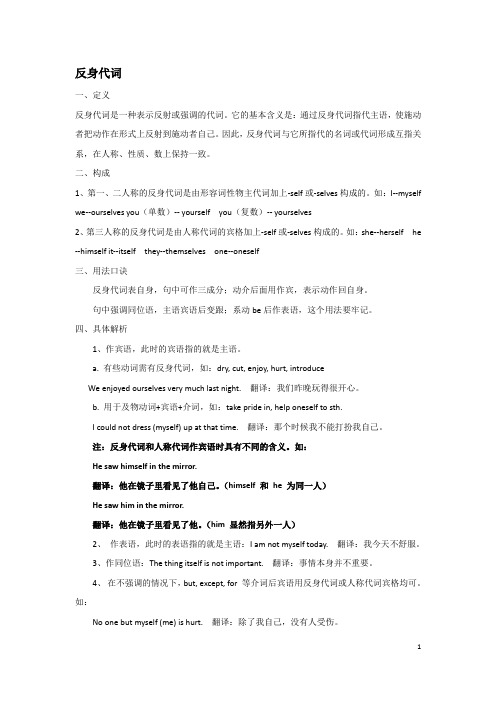
反身代词一、定义反身代词是一种表示反射或强调的代词。
它的基本含义是:通过反身代词指代主语,使施动者把动作在形式上反射到施动者自己。
因此,反身代词与它所指代的名词或代词形成互指关系,在人称、性质、数上保持一致。
二、构成1、第一、二人称的反身代词是由形容词性物主代词加上-self或-selves构成的。
如:I--myself we--ourselves you(单数)-- yourself you(复数)-- yourselves2、第三人称的反身代词是由人称代词的宾格加上-self或-selves构成的。
如:she--herself he --himself it--itself they--themselves one--oneself三、用法口诀反身代词表自身,句中可作三成分;动介后面用作宾,表示动作回自身。
句中强调同位语,主语宾语后变跟;系动be后作表语,这个用法要牢记。
四、具体解析1、作宾语,此时的宾语指的就是主语。
a. 有些动词需有反身代词,如:dry, cut, enjoy, hurt, introduceWe enjoyed ourselves very much last night.翻译:我们昨晚玩得很开心。
b. 用于及物动词+宾语+介词,如:take pride in, help oneself to sth.I could not dress (myself) up at that time.翻译:那个时候我不能打扮我自己。
注:反身代词和人称代词作宾语时具有不同的含义。
如:He saw himself in the mirror.翻译:他在镜子里看见了他自己。
(himself 和he 为同一人)He saw him in the mirror.翻译:他在镜子里看见了他。
(him 显然指另外一人)2、作表语,此时的表语指的就是主语:I am not myself today.翻译:我今天不舒服。
- 1、下载文档前请自行甄别文档内容的完整性,平台不提供额外的编辑、内容补充、找答案等附加服务。
- 2、"仅部分预览"的文档,不可在线预览部分如存在完整性等问题,可反馈申请退款(可完整预览的文档不适用该条件!)。
- 3、如文档侵犯您的权益,请联系客服反馈,我们会尽快为您处理(人工客服工作时间:9:00-18:30)。
什么是反身代词?
• 反身代词又称为自身代词,表示动 作执行者本身。它还可以在句中起 到强调的作用,用以加强语气。
【粉墨登场】
• 英语中共有八个反身代词,在使用时应注意和 它所指的相应的对象在人称、性别、数上保持 一致。其基本形式如下表所示: 第一人称 第二人称 第三人称
如:We must look after ourselves very well.
我们必须好好照顾自己。
• 2 可用作主语或宾语的同位语,常用来加强 语气。
如:She herself will fly to London tomorrow. 明天她自己将要坐飞机去伦敦。 I met the super star himself last week. 我上周见到了那位明星本人。
9. Xiao Hui, can you introduce _________ to us ? 10. Bill wants to teach_________ French from now on.
2 反身代词表示“某人自己”,不能表示 “某人的东西”,因为它没有所有格的形 式。表达“某人自己的(东西)”时,须 要用 one’s own. 如:我用我自己的蜡笔画画。 (误)I’m drawing with myself crayons. (正) I’m drawing with my own crayons
• hurt oneself摔伤自己 say to oneself自言 自语 • lose oneself in 沉浸于,陶醉于……之中 • leave sb. by oneself把某人单独留下 • buy oneself sth.给自己买……东西 • introduce oneself 介绍……自己
பைடு நூலகம்
• 3 用在某些固定短语当中。
如look after oneself / take care of oneself 照顾自己 teach oneself sth./ learn sth. by oneself 自学 enjoy oneself 玩得高兴,过得愉快 help oneself to sth 请自用……(随便吃/喝些……).
•掌握反身代词的用法了吗?请到 “练练吧”中的“反身代词练习”中 一试身手吧!
趁热打铁
我们刚刚看完反身代词的用法show,现在来这里练练身手吧!
1. My classmate, Li Ming, made a card for _________ just now. 2. Bad luck! I cut _________ with a knife yesterday. 3. They tell us they can look after_________ very well. 4. My cat can find food by_________ . 5. Help __________to some beef, boys.
【温馨提醒】
• 1 反身代词不能单独做主语, 但可以做主语的同位语,起强 调作用。
如:我自己能完成作业。 (误)Myself can finish my homework.. (正) I myself can finish my homework. / I can finish my homework myself.
单数
复数
myself
yourself
ourselves yourselves
himself herself itself themselves
【用法展现】
• 1 可用作宾语,指的是宾语和主语表示同一 个或同一些的人或事物。 如:Maria bought herself a scarf. 玛丽亚给自己买了一条围巾。
6. Jenny enjoyed_________ in the park yesterday afternoon.
7. We can finish our homework by_________ . 8. The blind girl lost_________ in the beautiful music.
